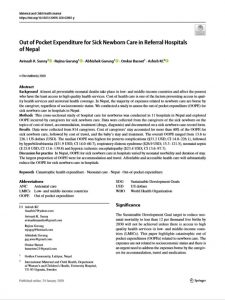
Background
Almost all preventable neonatal deaths take place in low- and middle-income countries and affect the poorest who have the least access to high quality health services. Cost of health care is one of the factors preventing access to quality health services and universal health coverage. In Nepal, the majority of expenses related to newborn care are borne by the caregiver, regardless of socioeconomic status. We conducted a study to assess the out of pocket expenditure (OOPE) for sick newborn care in hospitals in Nepal.
Methods
This cross-sectional study of hospital care for newborns was conducted in 11 hospitals in Nepal and explored OOPE incurred by caregivers for sick newborn care. Data were collected from the caregivers of the sick newborn on the topics of cost of travel, accommodation, treatment (drugs, diagnosis) and documented on a sick newborn case record form.
Results
Data were collected from 814 caregivers. Cost of caregivers’ stay accounted for more than 40% of the OOPE for sick newborn care, followed by cost of travel, and the baby’s stay and treatment. The overall OOPE ranged from 13.6 to 226.1 US dollars (USD). The median OOPE was highest for preterm complications ($33.2 USD; CI 14.0–226.1), followed by hyperbilirubinemia ($31.9 USD; CI 14.0–60.7), respiratory distress syndrome ($26.9 USD; 15.3–121.5), neonatal sepsis ($ 25.8 USD; CI 13.6–139.8) and hypoxic ischemic encephalopathy ($23.4 USD; CI 13.6–97.7).
Discussion for practice In Nepal, OOPE for sick newborn care in hospitals varied by neonatal morbidity and duration of stay. The largest proportion of OOPE were for accommodation and travel. Affordable and accessible health care will substantially reduce the OOPE for sick newborn care in hospitals.